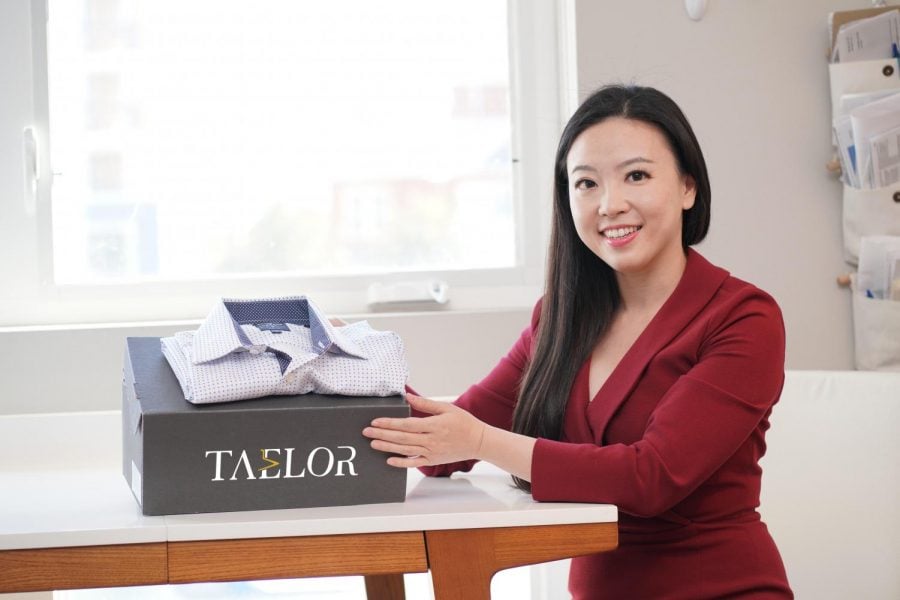NU lecturer-founded startup Taelor addresses style and sustainability with artificial intelligence
Taelor, a clothing rental service founded by a Medill lecturer, seeks to address sustainability and convenience in men’s fashion
June 24, 2021
Menswear rental subscription service Taelor weaves together artificial intelligence and sustainability to curate stylish clothes for eco-friendly professionals.
The women-led, Silicon Valley-based business was launched last year by Medill lecturer Anya Cheng (Medill M.S. ’08). Cheng said the company seeks to cater to customers’ needs for convenience and style while also tackling sustainability.
As of early May, the company had 400 customers on its waitlist, Cheng said.
“Taelor is not just about making people look great but also about helping them to dress like who they want to be,” Cheng said. “I hope this is a way to help more people to reach their full potential.”
According to Grace Hsieh, a product design manager at Taelor, each customer pays a flat monthly fee in exchange for curated rental clothes. Once they sign up, the service invites them to complete a style quiz, after which, artificial intelligence and stylists will come up with recommendations.
“(We) learned that people don’t actually fully trust the AI, because they feel like, ‘That’s a fancy word, like how do I really know about my preference?’” Hsieh said. “(So) we added on the human touch.”
After the ready-to-wear clothing items arrive, recipients have two weeks to try them out. Because Taelor is a rental service, customers are not obligated to buy the outfits. However, they will receive discounts up to 70 percent if they choose to purchase.
Rita Liao (McCormick M.S. ’12) said despite graduating with a degree in biotechnology, she became interested in entrepreneurship. She joined the startup to research the industry, including on Gen-Z and the fashion market in regard to sustainability.
“We found some research data and it shows that the market is growing,” Liao said.
Liao also researched the company’s competition in the Alumni New Venture Challenge at the Polsky Center for Entrepreneurship and Innovation at the University of Chicago. Taelor advanced to finals.
The idea to start an AI-driven clothing rental service came from Cheng’s own experiences, she said. Cheng said she started using the method five years ago and fell in love. She has not purchased a clothing item since, she said.
However, Cheng said she could not find a service that exclusively catered to menswear. She said she has observed a more sustainability conscious and secondhand positive audience over the years that makes now a ripe market for a service like Taelor.
“(Taelor’s customers) want the fairy godmother to help them to style the look better, or they know what they want,” Cheng said. “They don’t want to keep buying stuff where they feel like they are wasting time.”
Instead of using the buy-subscription mode recently popularized by companies like Stitch Fix, Taelor elected to adopt a rental system because buy-based subscription boxes are still wasteful, Cheng said. Research shows people only wear 20 percent of their closet regularly, she emphasized, which compounds to a huge amount of garbage over a lifetime.
By adopting a rental system, the life cycle of the garment is much longer, leading to a more circular fashion model, Cheng said.
At NU’s Integrated Marketing Communications, Cheng learned about the evolution of audience insights and transferred her education to her business.
Even though Cheng has worked at companies such as Facebook in expanding its commerce branch to overseas markets, she said that she still remembers difficulties she faced after graduating in 2008. Cheng said she went from Los Angeles to New York City trying to find a job and cold called every alum she knew.
Cheng said she finally returned to Chicago and got her first job at a company after crafting a business plan that incorporated what she learned in New York City and Los Angeles.
“(It taught) me the ability to solve a problem when there is no solution and find a solution for it,” Cheng said.
Email: yunkyokim2022@u.northwestern.edu
Related Stories:
— Student startups awarded over $300,000 in annual VentureCat competition
— Virtual matchmaking at The Garage connects students to startups
— Students raise awareness on ethics of artificial intelligence



